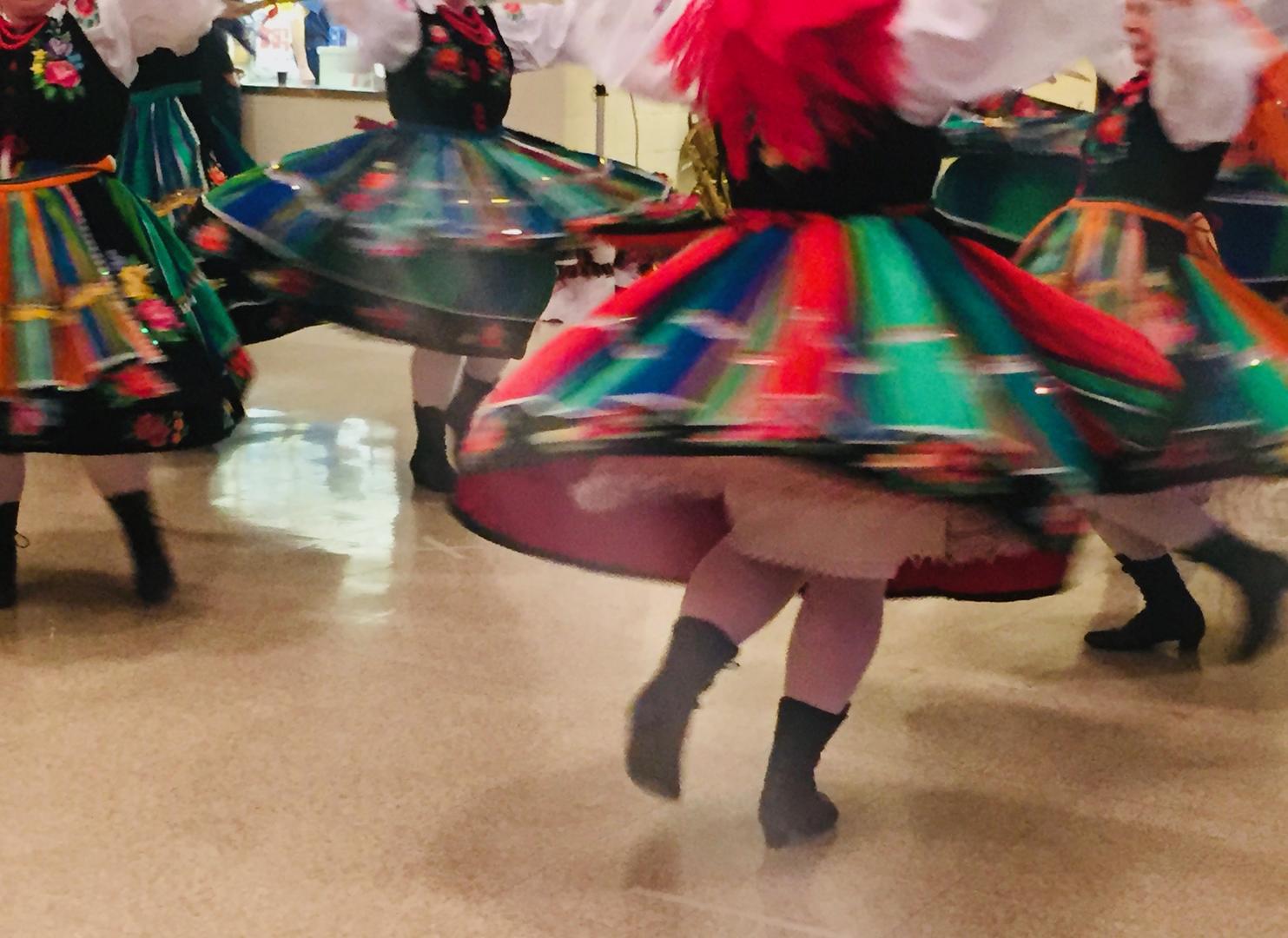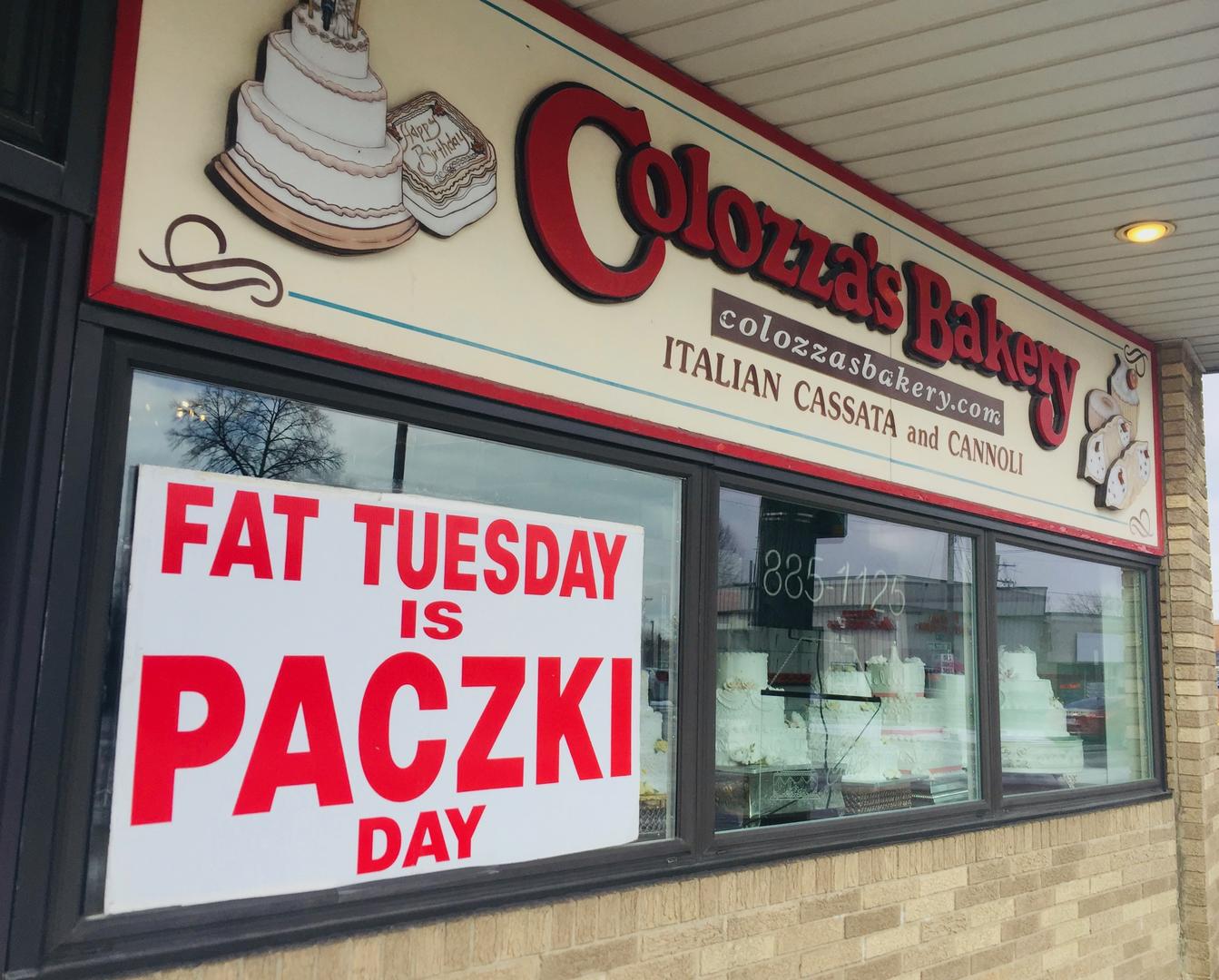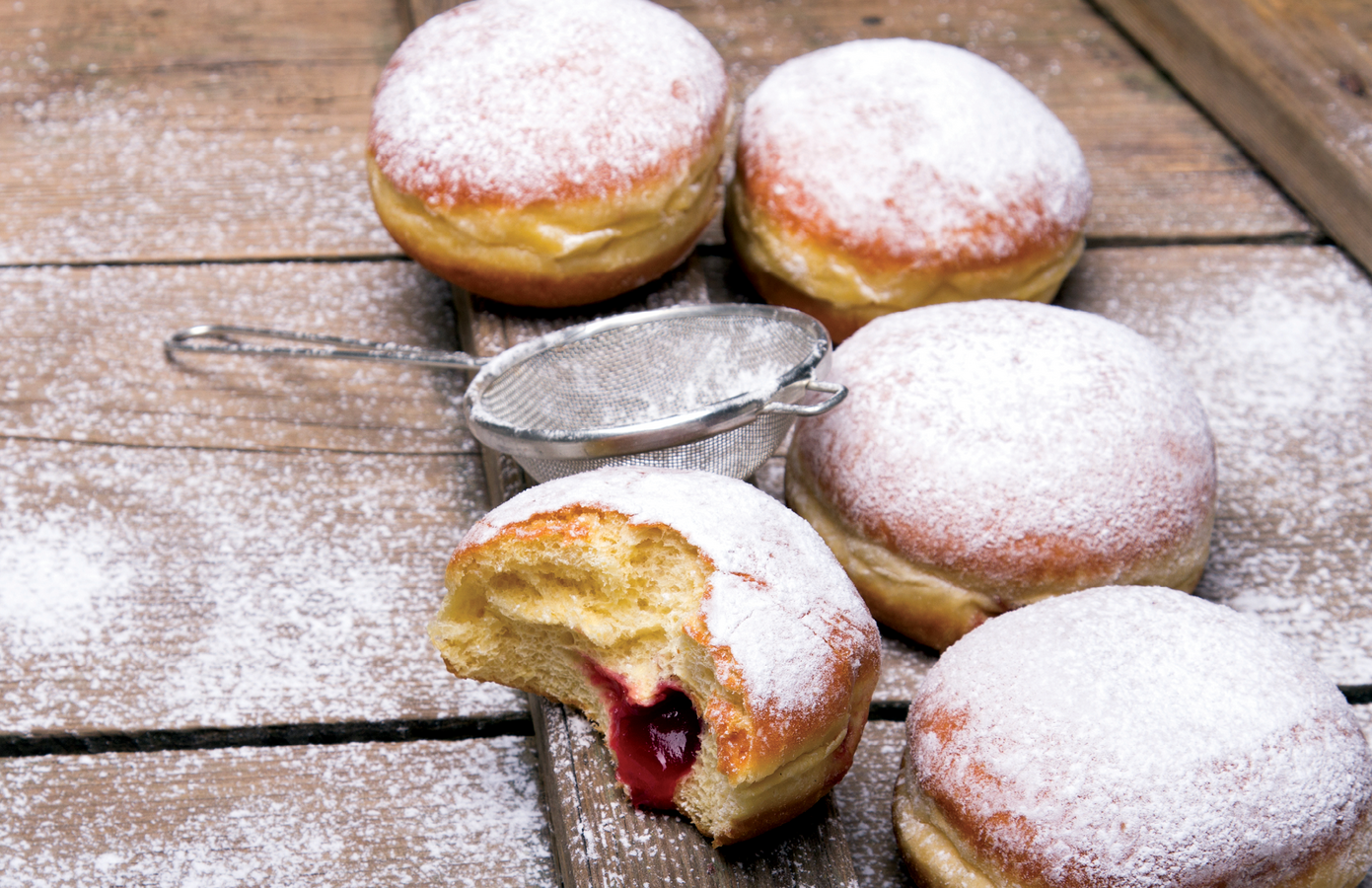The line to the New Martha Washington Bakery flows around the corner from Joseph Campau Street onto Caniff Street. It is 8 degrees Fahrenheit in Hamtramck, Mich., but with the cutting wind this morning, it feels more like 8 below zero. The 20 degree temperature forecast for the day seems far away and downright tropical. People burrow into coats and hats emblazoned with GM and Ford logos. A television crew is set up near the bakery door. Across the street, a group of women pass by in burqas topped with ski caps and puffy coats. Their black robes skim their boots and lend a certain elegance to a sidewalk crusted with salt and old snow. There is the sense that we have landed in another world—and, in fact, my niece and I have landed in another world. We have taken many road trips together, but this is our first time in this city, which is so small, it seems like a section of Detroit.
“Are you warm enough?” I ask my niece. Nicole is hidden under layers of down and a fur-trimmed hood.
“These boots are made for the Arctic,” she says.
I stopped feeling my toes after leaving the car and shuffling past blocks of struggling businesses and empty storefronts and a mural of Krakow put up to honor Pope John Paul II when he visited Hamtramck in 1987. Now I rock back and forth to keep my feet from becoming blocks of ice while calculating how much longer it will take us to reach the door. An hour, I think. Maybe more. Every few minutes, the door opens and someone steps out of the building, white baker’s boxes stacked in their arms. The line cheers. “Where’s the party?” Someone shouts and the person responds, “You’re almost there.” This is a lie, of course. But it is the kind of lie I appreciate as we inch ever-so-slowly toward the bakery.
Because we have no pen, Nicole and I chant our order to commit it to memory—raspberry, rosehip, apricot, Bavarian cream—our breath making clouded streamers in the air.
Something catches my eye at the front of the line. Slips of paper flutter as a stack is passed from one gloved hand to the next. Order forms. A hopeful sign. The blind woman in front of us tells her friend which flavors to circle. “Cherry,” she says without hesitation. “Chocolate cream.” Because we have no pen, Nicole and I chant our order to commit it to memory—raspberry, rosehip, apricot, Bavarian cream—our breath making clouded streamers in the air. Friends deliver coffee, then shiver their way back to their cars. Those who remain become a band of perseverance, alternating between feelings of hardiness and despair. People begin to swap stories of other years and the many hours of waiting.
“You sure you’re O.K.?” I ask again. Nicole is grown, but, at about 100 pounds, is the smallest person in line. “I’m fine,” she repeats; and I wonder why, unlike my sensible niece, I have never invested in a decent parka and a pair of mukluks.
Later we will go to Motown and the Detroit Institute of Arts. Yesterday we had stopped at the Rock and Roll Hall of Fame in Cleveland, and I looked out at Lake Erie while Nicole checked out exhibits on David Bowie and the roots of rock and roll. But these are merely side trips. Standing in line at this bakery is the actual reason for our visit and represents the pinnacle of our paczki trip.
Pre-Lenten Tradition
When it comes to paczki, the first order of business is pronunciation. “Punch-key,” people say in Buffalo, but the sounds of the vowels rearrange themselves the further west we travel. Had we continued on to Milwaukee or Chicago, we would have heard “pownch-key” more often than the “poonch-key” encountered in Cleveland and Detroit. But no matter how you pronounce the name, paczki amount to deep-fried circles of dough filled with jam, custard or cream. Topped with powdered sugar or glaze, flavors range from old-world classics such as rose petal and povidla (prune) to newfangled varieties like marshmallow and birthday cake. In Poland, paczki are eaten on the Thursday before Lent, but they are a Fat Tuesday tradition in Polish communities across the United States. Like other Fat Tuesday traditions, indulging in paczki is about feasting and the abandonment of restraint, a massive and last hurrah before the austerity of Lent. On a practical level, for hundreds of years the baking of paczki allowed Polish households to use up stores of sugar and lard before the long days of fasting began.

Poles brought their paczki recipes with them as they arrived in waves to Chicago, Buffalo and Detroit in the late 19th century. The jobs they found (often in automobile or meatpacking plants, factories, farms and mines) were rough. Discrimination was high and, like other groups, Polish immigrants banded together, with their Catholic faith and traditions cementing their sense of identity. When a Dodge plant opened in Hamtramck in 1914, it attracted Polish workers. By 1970, Hamtramck was about 90 percent Polish. Fifty years later, the Polish-American population hovers at around 10 percent.
But while the physical face of Polish America has changed over the years, traditional Polish enclaves still serve as cultural hubs. Let the Gulf Coast have its parades and king cakes, the North Coast has the Polka Hall of Fame and Paczki Day.
And while paczki connoisseurs in Cheektowaga or Chicago might roll their eyes, I say with no disrespect that paczki are basically doughnuts. With options like pistachio and poppy seed, they are more distinctively flavored. Their eggier dough renders them more stalwart than fluffy. Paczki are a sort of pastry grenade, imparting more texture than the easy melt of a Krispy Kreme. I have sampled a few in my life, the sort that are sold alongside king cakes in grocery stores in the week leading up to Lent. I had been curious about the strangely named pastries for years and decided to learn more. Nicole is always up for a road trip. A road trip featuring doughnuts—well, who could pass that up?
Buffalo
Two days earlier, we had arrived at Holy Mother of the Rosary Cathedral in Lancaster, N.Y. (Polish National Catholic Church) just as the polka music began. Billed as Western New York’s largest paczki celebration, the event is in its 22nd year. After paying our entry fee, we passed a vendor selling Buffalo Bills hats and leggings. Girls in folk costumes flitted about, red and floral ribbons trailing behind them.
Those not dancing ate cabbage rolls and kielbasa, pierogi and pickles, sandwiches made of sausage and good bread.
We pushed into the large hall and scored a spot among the throng of people. Most wore red and were seated at long tables watching as the band played under the bingo sign and people waltzed around the dance floor. Sisters and friends circled past. Grandmothers danced with granddaughters. A toddler held hands with an older sister wearing an enormous bow in her hair. A man trotted past with his partner, straight-backed and head held high. Even the priest made his way around the dance floor as the band played waltzes and polkas, the thump of drum and pull of accordion helping everyone keep time. Those not dancing ate cabbage rolls and kielbasa, pierogi and pickles, sandwiches made of sausage and good bread. I had already been enchanted by the music and the dancers, but when a woman in the kitchen surprised me with an extra pierogi, I officially fell in love with Paczki Day.
The Polish Heritage Dancers of Western New York took the stage next. Women in bright kerchiefs moved from slow waltzes into spirited obereks, their colorful skirts flaring as they twirled, each moving so quickly she became a spinning top. Next came the younger dancers, teenagers in pairs, followed by girls in floral wreaths and boys in red krakuska caps ornamented with ribbons and peacock feathers.
We left as the paczki Queen and King were crowned. It was hard to tear ourselves from the warmth of the church hall and the beautiful dances but we wanted to make Cleveland by nightfall. We ran to the car and blasted the heat, laughing and replaying our favorite parts. “The bonus pierogi!” I said to Nicole. “The raspberry paczki,” Nicole said back. We pulled away from Holy Rosary and pointed the car west. Our paczki pilgrimage had begun.
Cleveland
As we drove into Parma along Cleveland’s southern edge the next morning, we noticed shop windows in featuring red paczki signs. We admired the golden domes of St. Josaphat’s Ukrainian Catholic Cathedral; and though Seven Roses Polish Deli and Rudy’s Strudel & Bakery were both highly rated and close by, both were closed on Mondays. Thankfully, Colozza’s was open. Clearly an Italian bakery, they say that everyone is Polish during paczki season, and Colozza’s glass cases brimmed with paczki dusted with powdered sugar and topped with dabs of cream. We swooned over flavors like pistachio and cannoli, but there was no time to dawdle because a line was forming, with people buying dozens at a time. We settled on two each; and as we stepped from the bakery, a woman approached with a smile, saying, “I hope you saved some for me!”
A certain friendliness accompanied the paczki events, we had already noticed—a loosening of the walls and guardrails that often divide us. “You should become a dancer,” a stranger had encouraged Nicole back in Buffalo. Nicole is of mixed race and was the only person of color in the hall. Like most of my nieces and nephews whose parents stopped attending church in adulthood, she was not raised with Catholic traditions, and neither of us have Polish blood. We were each outsiders in our own way. But Nicole said she felt comfortable. So did I. The gentle camaraderie of the holiday helped to explain why.

Once inside the car with our open bakery box, I tried to explain Fat Tuesday. Lent, I said, is a time of giving something up or of changing a problematic behavior. “The idea isn’t sacrifice so much,” I said, but corrected myself. “Or it is about sacrifice, but not simply for its own sake.” I used my own relationship with sugar as an example. I have never met a doughnut I did not like. I can recall in perfect detail a red velvet doughnut from Gibson’s in Memphis and the transcendent sweetness of a glazed ring from Donuts Delite in Rochester, N.Y.
“Sugar is my Kryptonite,” I told Nicole. It is true. All too often, I turn to fig cookies instead of what I most need, such as a long hike or prayer to recalibrate my connection with God. “Lent helps to clear the decks and wipe away whatever stands in the way of being the best version of yourself,” I said to my nonreligious niece. Of course, the fact that we were scarfing down paczki as I explained all this rendered my Lenten pep talk largely theoretical.
We stopped at the Krakow Deli on our way out of town, looking at shelves of sugar lambs and Polish chocolates and left with frozen packages of cheddar and sauerkraut pierogi.
With more time we would have kept going to Chicago. But Paczki Day is a Tuesday, and unless we flew, we could only make it so far. We settled on Hamtramck, a two-square-mile city only five minutes from Detroit’s center. Hamtramck made national news when a local mosque won the right to broadcast the call to prayer in 2004 and when it became the first Muslim-majority city council in the United States in 2015. Once a Polish stronghold, it is now Michigan’s most internationally diverse city, whose residents speak 26 different languages. In a rapidly changing religious and cultural landscape, Hamtramck struck me as potentially emblematic. While it is still an immigrant city, change has not always been easy as the Polish-Catholic community gave way to immigrants from Bosnia, Yemen and Bangladesh.
Nonetheless, on Fat Tuesday, Hamtramck is all about the paczki. There are paczki hot dogs and paczki burgers—even paczki ale. The Polish League of American Veterans hosts an annual paczki-eating contest. Bars sell paczki “bombs” filled with vodka, while bands with names like the Polish Muslims and the Kielbasa Kings belt out polka-infused tunes. Despite all this, the simple pastry and the traditional bakeries that churn them out take center stage. Which is why, like thousands of others in cities along the Great Lakes, Nicole and I withstand polar temperatures and the slowest line I have ever stood in to claim a dozen paczki of our own.
Hamtramck
Located in a neighborhood dotted with kabob shops and Polish diners, the New Martha Washington Bakery opened in 1925. Sunca Bakic’s family took over the bakery in 1973. Known as Sandy to her many customers, Sunca grew up on paczki. Beginning on Fat Thursday (the Thursday before Fat Tuesday), she says, they work 15 to 18 hour days until Sunday, when they come in at 6 a.m. and do not leave until 10 p.m. on Tuesday, relying on two-hour catnaps and adrenalin to power them through the rush.
“Close the door,” people shout in unison. “The paczki need to rise!”
And it is a rush for those behind the counter, while, for everyone else, it is about patience. After an hour or so, the moment Nicole and I have been waiting for finally arrives. We had imagined getting inside the bakery would be the end game, but we discover as we peer through the door that the small space in front of the counter snakes into three lines, with about 50 people crammed into a tight S line. Still, we celebrate as we walk through the door. The air is warm with the scent of sugar and flour.
Every few moments, someone squeezes through the door as another leaves. If the door stays open too long or someone tries to wedge himself in before there is adequate space, the line rebels: “Close the door,” people shout in unison. “The paczki need to rise!”
A bearded man enters. People are already swapping bits of their lives, but the new man is all enthusiasm as he chats up the line and poses a series of questions. “Which flavor is best?” and “How do these paczki compare with those at the New Palace Bakery?” Then he asks, “Who all is giving up anything for Lent?” A few of us raise our hands. Clearly, Paczki Day has moved beyond its pre-Lenten origins. This is not surprising. We are generally more comfortable with Mardi Gras than with Ash Wednesday as a culture. I think of the paczki we have eaten over the past two days and the warm pockets of dough we will eat very soon and wonder whether you can have a good Fat Tuesday if it is not followed by Ash Wednesday. Even as I inch closer to the counter and consider adding a few blueberry items to my order, it seems to me they are inexorably linked, the opening up and feasting and the restraint and letting go.
The bearded man infuses some music into the scene through speakers in his coat pockets. The Steve Miller Band is followed by “The House of the Rising Sun,” but our bakery D.J. does not hit his stride until “Baby, I Need Your Loving.” This is Detroit, after all, and The Four Tops are a local treasure. A lady tying boxes with twine nods her head. The woman in front of us hums along. It is a diverse line, in terms of race and class and religion, but, as much as they can, each of these lines fades away as black and white people laugh and sway to the song. Something about withstanding the long wait and the brutal cold makes it so nothing is as real to us now as the glory of being inside, the scent of the paczki and the good old song. And as lovely as the pastry and the tradition are, the paczki suddenly seem to me to simply offer an excuse for us to indulge in the increasingly rare treat of coming together without strife.
Though no one here is likely to join me for Mass and ashes at St. Josaphat’s tomorrow, half the population in Hamtramck lives in poverty, and nearly half are immigrants. Even those who have come in from other neighborhoods have survived the massive struggles of this city. The people waiting at the New Martha Washington Bakery clearly understand hard times and sacrifice.
This is what our paczki tour taught me: that life is not simply about feasting or fasting but the necessity of both; that, like Hamtramck, Mich., our country is a place of new and old, black and white, Muslim and Christian, sacrifice and celebration—of great difficulty and even greater possibility; that sometimes an unassuming bakery in Detroit can feel like church.
Sandy, at the New Martha Washington Bakery, believes that Paczki Day is the best holiday—better even than Christmas, which can leave many feeling sad or isolated. I think of the Four Tops and the heads bobbing and the smiling faces, not one among them looking dejected or tired, even after hours of waiting and the bitter cold—all of us moved by a sweetness greater than sugar or froth.
“If everybody had a Paczki Day around the world,” Sandy says, “the world would be a better place.”










